It's very easy to spot good leadership when it happens.
Take, for instance, how an old manager of mine used to ask my advice on business strategy in our weekly 1:1s — and then provide constructive feedback on it.
While I might not have recognized it at the time, I now see he was teaching me to think about how my role fit into the company's bigger mission.
Or, consider how my current manager seeks out learning and development opportunities for each of her direct reports. Whenever she finds a workshop or online class that could help me grow, she passes along the information.
All of which is to say: Good leadership doesn't look, sound, or act just one way. There are a myriad of ways for a good leader to educate and inspire others.
Which means leadership is a harder skill to master than others. It isn't like mastering Excel, which requires knowledge of specific, fixed formulas. Instead, good leadership is more ambiguous, and mastering it is less of a linear path. There will be setbacks, and moments where you feel you didn't act as a good leader should. But there will also be incremental moments of true growth.
Whether you're an individual contributor or already a team lead, there's always room for improvement. Here, we'll cover leadership development on various levels — from individual contributor to senior management and above. Plus, hear leadership tips from Google, LinkedIn, Monday.com, and HubSpot.
We'll also explore how to achieve your career goals through actionable steps you can take to level-up and become a stronger, more effective leader.
Let's begin.
What is a leader?
Before we dive into how to become a leader, it's important we cover what a leader is.
At its most basic definition, a leader is someone who leads a group of people towards a common goal through inspiration, motivation, and strong vision setting.
For instance, a teacher leads her students towards the goal of learning and uses motivation and inspiration to help them reach that goal.
The motivation and inspiration aspects are key. A leader isn't just someone who barks orders and hopes people obey. Instead, an effective leader is highly emotionally intelligent and connects with his or her direct reports to create stronger relationships before driving the group towards change.
Additionally, a good leader is someone who is effective at big-picture strategizing, and equally adept at communicating that vision to the rest of the team.
If you're still unsure what a leader is, here are a few quotes from leaders who've defined the term for themselves:
- "As a business leader, I think of myself as a coach. It’s my responsibility to build a strong team, design a winning strategy and execute the strategy with excellence to bring the team to victory." — Thasunda Duckett, President and CEO of TIAA
- "Ensuring that people have everything they need to achieve the missions of an organization. That's it, all else is footnotes." — Hans Vestburg, CEO, Verizon Communications
- "Leadership is helping believe in a better tomorrow or a better outcome than you have today." — Marissa Mayer, Former CEO, Yahoo!
- "Leadership is helping people succeed, inspiring and uniting people behind a common purpose and then being accountable." — Paul Polman, Former CEO, Unilever
- "A leader is someone who can think strategically, simplify the strategy so everyone in the organization can understand it and communicate that strategy simply, enthusiastically, and in a caring way." — Ajay Banga, CEO, MasterCard
Now that we've covered a more broad, basic definition, let's explore some skills, traits, and qualities of good leadership to understand the definition on a more actionable level.
The Skills, Traits, & Qualities of Good Leadership
Good leadership looks different for every leader. Some leaders are quiet and calm; others are rambunctious and extroverted. There isn't a specific personality that lends itself best to effective leadership. And that's a good thing — at its core, leadership is about leading people, and people are diverse, so you want your leadership teams to reflect that diversity.
However, there are a few specific skills, traits, and qualities that have been identified as strong indicators of good leadership.
A few high-level leadership skills include:
- High emotional intelligence
- A growth mindset
- Strong communication skills
- Reliability
- Ability to give and receive feedback
- Decisiveness
To learn more about leadership skills (and how to improve them), take a look at What Are Leadership Skills? [+ How To Get Them].
For now, let's explore which skills are most relevant for various leadership roles.
Leadership as an Individual Contributor
You don't have to manage a team to be a leader. Instead, many individual contributors are strong leaders who need to develop leadership skills to manage projects or outcomes.
As an individual contributor, it is oftentimes your responsibility to have influence across the organization to drive projects across the finish line. This includes having the confidence to convince stakeholders that what you're doing matters to the organization, and that you're the best leader for the job.
Some of the most critical skills of an individual contributor include strong communication skills, time management skills, ability to work autonomously, and ability to collaborate effectively.
Here are a few specific examples of how individual contributors might need to demonstrate leadership skills:
- A social media marketer spearheading a new campaign across channels.
- A website designer who is in charge of re-designing the new company homepage.
- A blogger who notices a gap in an existing editorial strategy and wants to pitch a new topic cluster to leadership.
- A product marketer who needs to work with various teams to drive traffic and leads to a new product launch.
All of these employees need strong leadership skills — including the ability to empathize, remain flexible, listen actively to other team's agendas, and communicate their own vision effectively — and yet, none of them lead a team in a traditional sense.
To develop leadership skills as an individual contributor:
Learn to seek out feedback from the employees with which you work. Once one project is complete, ask them to complete a survey that requests information related to your time management skills, communication skills, or collaboration skills.
Leadership as a Manager
Once you're a manager, developing leadership skills becomes more a practice of trial-and-error.
To develop or strengthen key leadership skills, you'll want to request regular feedback from each of your direct reports, as well as your manager, to determine areas for improvement. Ask clear, actionable questions such as, 'What is one thing you'd like me to start doing? (Specific examples are helpful)' and 'What is one thing you'd like me to stop doing? (Specific examples are helpful)'.
Additionally, take the time to reflect on situations to determine how you might shift your behavior moving forward. Good leaders are the first to admit their mistakes.
For instance, if you're managing an entry-level employee and recognize you didn't give her enough context or support before suggesting she meet with her first client, you'll want to reflect and decide how you'll change moving forward.
Then, in your 1:1, you can tell her: "I apologize for pushing you into a client situation without ensuring you had all the context and information you needed to succeed. Moving forward, I've altered our team training schedule to ensure employees have more time to find their footing before meeting with a client."
Finally, as you move into a manager role, take the time to identify your management style. Understanding your management style can help you uncover inherent strengths (and weaknesses), and expand upon those.
To develop leadership skills as a manager:
Ask your direct reports for candid, honest feedback. Reflect on situations and iterate on your behaviors over time. Finally, identify your management style and be self-aware about your areas for improvement.
Leadership as a Senior Manager and Above
When you become a senior manager, your job shifts significantly — because you're now leading a team of managers.
To be effective as a senior manager, you'll want to ensure you know how to ask the right questions. In skip level meetings, for instance, you might be speaking with employees who feel intimidated and hesitant to point out issues they're seeing on the ground-level — but their perspective is invaluable for spotting weaknesses within the organization.
Skip level meetings can also help you determine which areas your direct reports might need coaching, as well as patterns of challenges and inefficiencies across the team.
As a senior manager, it's also your responsibility to identify and nurture future leaders. Seek out opportunities to coach and mentor lower level leaders to ensure your organization is prepped with leaders who can drive positive change.
Finally, a senior leader is someone who motivates and inspires the department at-large with visions of the future of the company — two, five, and even ten years out. She is someone who is able to clearly articulate where she sees the business, and industry, headed, to create a sense of purpose among employees.
To foster this skill as a senior manager, you'll want to be intentional about staying up-to-date with the competitive landscape and consistently making note of existing customer pain points and how your company might reduce friction and stay relevant in the years to come.
To learn more about this, take a look at How to Set & Achieve Marketing Objectives in 2021.
To develop leadership skills as a senior manager or above:
Practice the art of active listening and asking the right questions to discover weaknesses and gaps in your organization. Keep up-to-date with the competitive landscape. Find mentors or senior manager peers who will provide you with leadership feedback, and attend conferences or seminars to network with other industry leaders.
How to Achieve Your Leadership Career Goals
1. Identify your leadership style, and know your strengths and weaknesses.
Leadership isn't one-size, fits-all. So when you first decide you want to become a leader, it's vital you take the time to determine what type of leader you want to be.
If you've never been in a leadership position before, you can start by taking a leadership style assessment to determine your style.
Alternatively, if you have been a leader in a previous position (even informally), take a look at The 8 Most Common Leadership Styles & How to Find Your Own [Quiz] to see which style you feel you fit most accurately.
For instance, let's say you've determined you fit a 'Coach-Style Leadership' style. Coach-Style leaders are focused on identifying and nurturing individual strengths of each team member.
Since Coach-Style leaders focus on growth and success of individual employees, it's vital you're efficient at communication and relationship-building.
Alternatively, if you felt better suited for a 'Strategic Leadership' style, you'd want to hone skills related to strategic, big-picture thinking.
Once you've figured out your leadership style, it becomes easier to identify areas for improvement and areas of potential weakness.
To create a more comprehensive list, take the time to make a list of your strengths and weaknesses (and collect external feedback as well) — this can help you determine, with your manager, which areas of growth will be most necessary before you can earn a leadership position.
2. Seek out opportunities to become a role model or mentor.
To become a leader, you'll need to vocalize to your manager that you want to become one. Then, he or she can help you identify opportunities to begin practicing leadership informally.
Alternatively, try seeking out those opportunities for yourself. There are a myriad of ways to test out your leadership skills. Perhaps you sign up to become a mentor to a new employee, or grab coffee once a week with a new team member to provide guidance and support.
Outside of work, you can look for areas in your community to become a leader. For instance, you could volunteer as a mentor for a local high school.
3. Develop your communication skills.
A core tenant of strong leadership is good communication skills.
Leadership requires you to communicate constantly with various stakeholders, effectively sell them on your goals or vision, and create rapport to build trust among your team.
In a given day, a leader might go from a meeting with executives in which she needs to communicate the resourcing needs of her team, to a meeting with individual contributors where she needs to build trust, inspire, and motivate.
All of which is to say: Good leadership and strong communication skills go hand-in-hand.
To develop stronger communication skills, you'll want to start by practicing your active listening skills, learning how to assert your opinion in a helpful way, and asking for feedback from others on your existing communication skills. You might also seek out public speaking opportunities to strengthen your public speaking skills.
Empathy and emotional intelligence are equally critical to communicating effectively, and can help you build stronger relationships with colleagues.
For instance, let's say a colleague comes to you with a problem. She expresses that she's been overwhelmed and, as a result, won't be able to meet the deadline you'd initially agreed upon for a project.
While you might be frustrated or even angry initially, empathy can enable you to put yourself in her shoes, and understand that missing deadlines can happen to all of us. Additionally, emotional intelligence can help you monitor your own emotions and react appropriately.
As a result of having empathy and high emotional intelligence, you might respond like this: "Thanks for letting me know, and I'm sorry to hear you've been feeling overwhelmed. We've all been there. Give me some time to think over how we can come up with a solution to ensure we don't get behind on the project as a whole."
Rather than reacting purely based on personal feelings, emotional intelligence ensures you have the skills to keep your emotions in-check and respond to situations in positive, effective ways.
4. Ask big picture questions and learn to think about strategy.
When asked, "What skills are vital to being a good leader?", over ⅓ of HubSpot survey respondents reported 'ability to think strategically and to think about the big picture'. That skill alone won out over communication skills, decision-making skills, and interpersonal skills.
Thinking strategically doesn't happen overnight. When you're in a role that requires you to be focused on ground level details, it can be difficult to suddenly pull back and analyze bigger trends, challenges, and solutions — but it's vital for any leader to be able to do so.
Here are a few ways you can begin exercising that 'strategic thinking' muscle:
- Ask more big picture questions in meetings, even if it's not directly tied to your role. For instance, if you're a social media marketer and you're required to post Instagram stories for an upcoming product launch, you might explore questions such as, 'Why did our executive team choose to focus on investing in development for this product in particular?' 'How will this product expand our value proposition?' and 'What narrative are we telling around this product and how it fits into our existing product stack?'
- Expand your network outside of your immediate team. Grab lunches with members of the sales or services organization, and take the time to speak with those outside of your team. This will help you begin to understand what's happening in other areas of the organization, what other teams are working on, and challenges other teams are facing.
- Get organized with how you spend your time. While your day-to-day tasks are important, it's equally vital you carve out intentional time to focus on bigger projects or professional development opportunities. To do this, you might block off one hour every other week to focus on personal brainstorming — during this time, you might write down a list of higher-visibility projects you've been wanting to test out, or seek out workshops and courses in your area that will help you develop skills that your team currently lacks.
- Be willing to speak up. Beyond asking question in meetings, practice feeling comfortable sharing your own perspective or opinion. Show your colleagues you're willing to communicate new ideas or get creative when it comes to existing strategies.
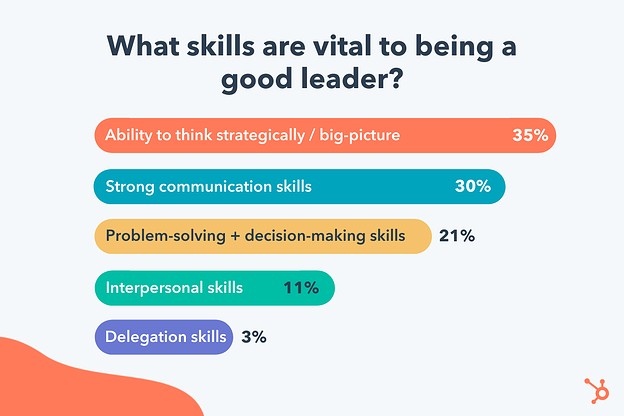
5. Take on more responsibility.
To begin levelling up in your career, you'll need to seek out additional opportunities to expand your skillset and demonstrate your willingness to grow professionally.
The easiest way to do this is to have an honest conversation with your manager in which you ask where the team's needs are, and how you can help your team meet those needs. Alternatively, perhaps you've observed a weak spot on your team and you feel confident you know how to fix it — in that case, you might bring your proposal to your manager.
It's vital you have buy-in from your manager since taking on more responsibility outside of your existing role could look unprofessional if your manager doesn't know why you're adding tasks to your plate.
If you're interested in becoming a team manager, for instance, you might tell your manager: "I noticed we're hiring a summer intern. If we don't already have a plan in-place, I'm wondering if I could become the intern's mentor or manager for the summer to strengthen some of my leadership skills?"
6. Go where the needs are.
I received this advice early in my career after I'd pitched a lengthy project to my manager. The pitch was strong — except my solution didn't solve a big problem, it solved a small one.
My manager said, "It looks like you created this pitch with your own personal interests top-of-mind. While it's always great if your passions can match business need, first and foremost, you need to work from the perspective of, 'What will help our business the most?'"
She had a point. After some reflection, I realized our team didn't need infographics designed for blog posts as much as the team needed more SEO knowledge and input. Rather than looking for design courses, I pivoted and signed up for a workshop on SEO. It was less interesting (personally), but it impacted our business on a broader scale.
Effective leaders don't just suggest random ideas when it suits them. Instead, they start by asking the right questions and analyzing existing weak spots. Then, they work to fill in those gaps and create real change for their organizations.
7. Practice self-awareness.
Self-awareness is an incredibly vital skill for any leader.
For instance, leaders who can see how their employees view them are usually more effective, and have stronger relationships with their employees. Additionally, self-awareness can help you correctly identify what you do well, and which areas you can potentially improve.
But if you think you're already a master in self-awareness, think again. One study estimates only 10-15% of people are truly self-aware. And, even if you are self-aware, there is always opportunities to strengthen the skill.
In this context of developing leadership skills, self-awareness can help you:
- Assess your current relationships with your colleagues, and how you might improve it. (Example: You recognize you were dismissive of another colleague's ideas in a recent meeting, and she's been avoiding you since. With that self-awareness, you can apologize for your behavior and practice more open-mindedness moving forward.)
- Analyze your own internal thought patterns, and recognize which ones aren't serving you, to build confidence. (Example: You feel imposter syndrome every time you present to your team, and you're self-aware enough to know it's because you're constantly thinking, 'I don't deserve to be here'. As a result, you work on self-affirmation, and create a folder on your desktop of positive reinforcements from colleagues.)
- Figure out which skills you lack that you'll need to develop before moving into a leadership role. (Example: After some reflection, you realize you aren't often honest about your mistakes, which can make you seem untrustworthy. As a result, you put effort into admitting when you've failed to your manager or team.)
8. Take the time for quiet reflection.
Becoming an effective leader doesn't happen overnight. And, unfortunately, there's no 'end' to becoming a good leader. For your entire leadership journey, you'll continuously iterate and grow.
When setbacks and failure happens, it's important you become adept at reflection. As you put these leadership tips into practice, take the time to regularly assess how you're doing. Leadership is trial-and-error, and as you practice new behaviors to grow your leadership skills, you'll want to determine which feel most authentic to you.
Ultimately, good leadership doesn't mean mirroring what others have done. It means figuring out what works for your personality and style, and expanding on those innate qualities. Since authentic leadership is the single strongest predictor of an employee's job satisfaction, it's imperative you take the time to grow into a leader in the way that's right for you.
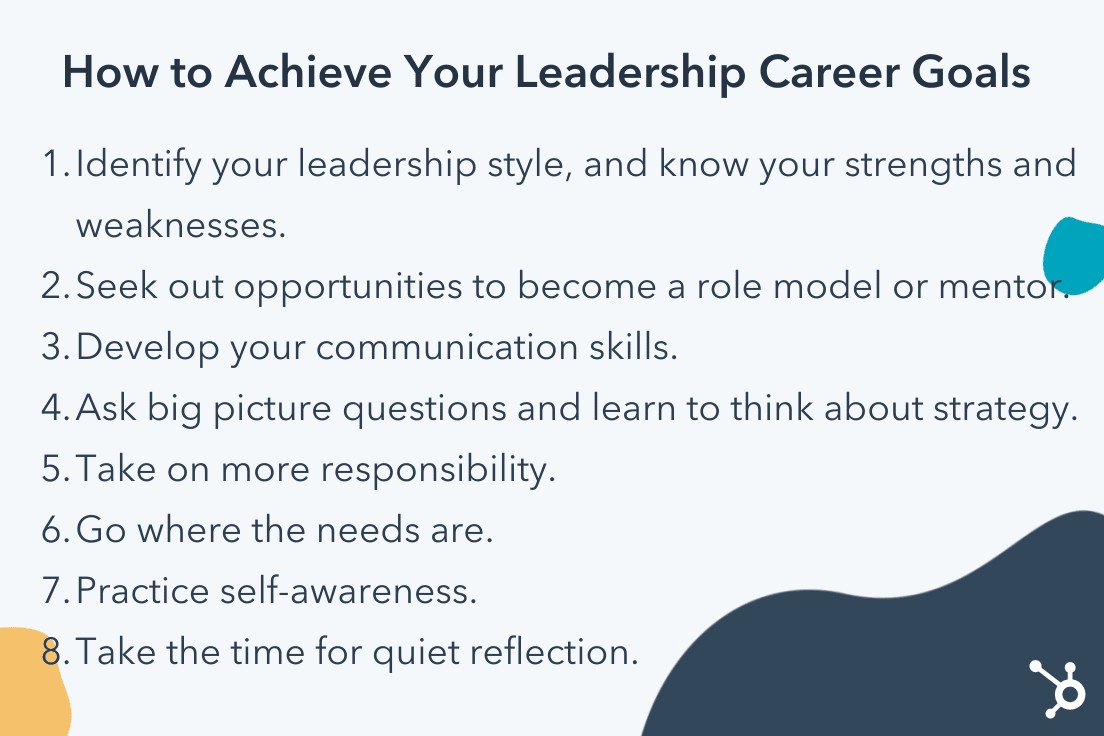
Why Goal Setting Is a Critical Component of Good Leadership
As you move into a leadership role, you might feel pulled in many different directions by stakeholders with different goals.
This is why setting goals is vital for leading a team successfully: It keeps you focused on what matters for your team.
When you create goals for your team, you're effectively prioritizing what you will say yes (and no) to over a given period. Additionally, you're ensuring your team clearly knows where they're headed and how to get there — an essential component of good leadership.
Here are a few other reasons goal setting is a critical component of good leadership:
- Goal setting helps you enable your employees to work more autonomously. If they know what results you're expecting from them, it doesn't necessarily matter when, where, or how they reach those.
- Goal setting helps you stay focused on what matters most for your business. It ensures you don't get distracted with quick wins, and instead remain fixated on long-term success.
- Goal setting can spark more engagement from employees. If your employees understand the purpose and long-term vision behind their daily tasks, they'll likely feel more motivated.
- Goal setting increases a team's creativity and collaboration. Once you've decided where your team is headed, you don't necessarily need to dictate how to get there. Instead, empower your employees to brainstorm and test out interesting strategies to drive the team forward towards that goal. It's more interesting — and likely more effective — to gather unique perspectives when driving towards a common goal.
- It helps you know when to say no. When your employees come to you with interesting projects or experiments, it can be tempting to say yes. By setting clear team goals, you're ensuring each team member uses their time intentionally in pursuit of that goal alone.
When setting goals, consider using a SMART framework to ensure your goals are clear, actionable, and specific.
The Eisenhower Matrix can also help you figure out which tasks are highest priority once you've determined your team's short and long-term goals. The Eisenhower Matrix enables you to categorize your tasks in order of urgency and importance.
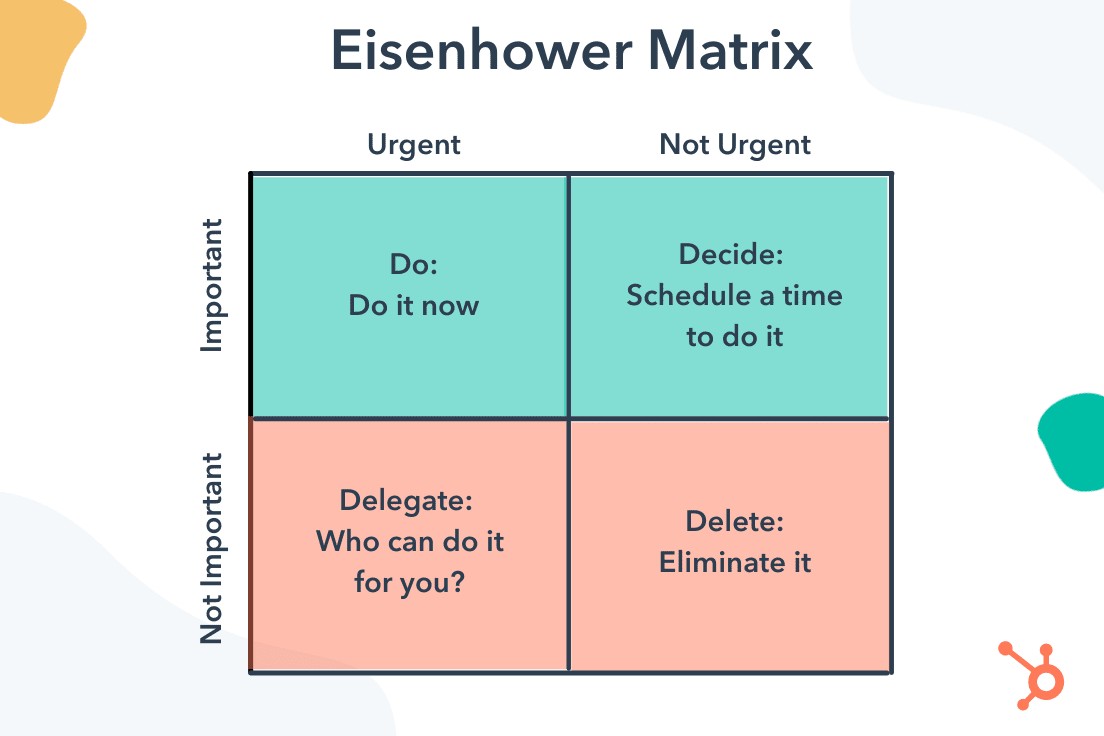
Now that we've covered goal setting as a vital component of leadership, let's explore a few other critical factors according to Google, LinkedIn, Monday.com, and HubSpot.
What Makes an Effective Leader? Tips from Google, LinkedIn, Monday.com, and HubSpot
1. Effective leadership is humbling.
Anders Mortensen, Google's Managing Director of Channel Partners, says effective leadership is humbling.
He told me, "In my early years of leadership, I was focused on the what — the results — while my team was focused on the how. It took me six years to realize that you don't define your leadership success, it's defined by others, and the how matters more than the what."
Mortensen adds that he believes your definition of team will either limit leaders, or elevate them.
"To become an effective leader," Mortensen says, "you have to make people around you better. Success is collaborative and your definition of 'team' will either limit you, or elevate you."
"The broader you define 'team', the more holistically you'll lead, and you'll become the bridge-builder that solves for the entire company, versus optimizing for just your own."
Ultimately, being a good leader means more than delivering exceptional results. It also means consistently motivating and supporting your team — through the highs, but also through the lows.
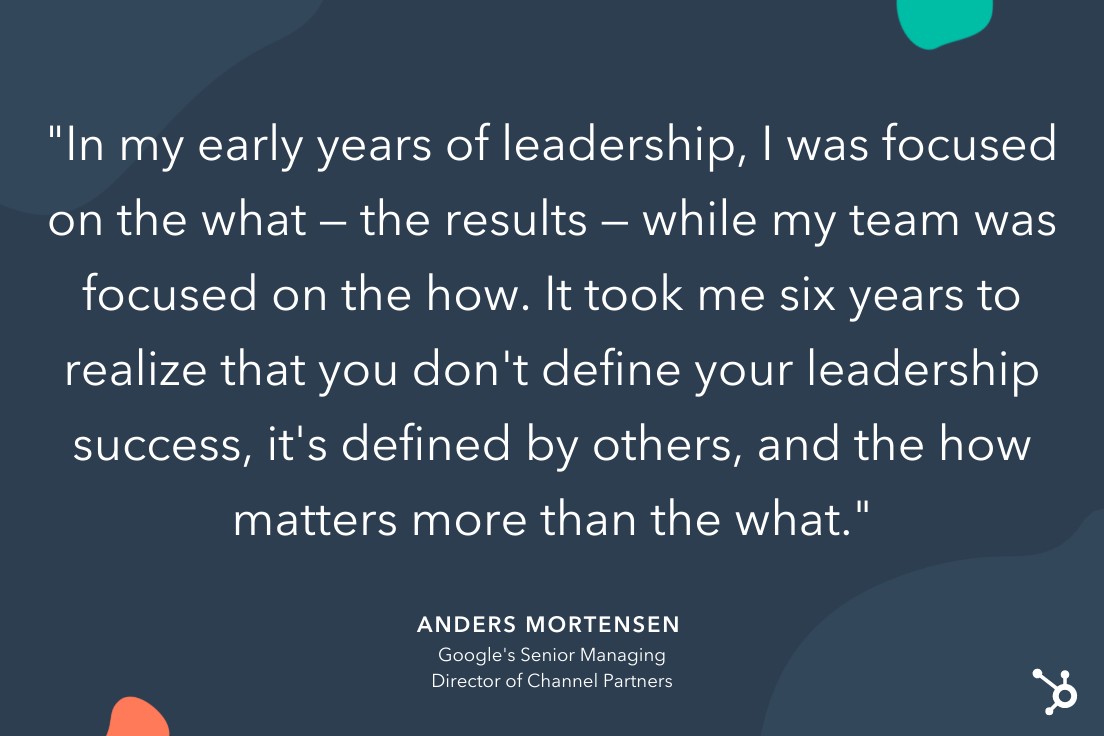
2. Effective leaders show compassion and encourage authenticity.
Alyssa Merwin, Vice President of LinkedIn Sales Solutions, told me compassion is a key characteristic of effective leaders.
As Merwin puts it, "For many reasons, employees may struggle to show up as their full selves at work, creating barriers for them to be successful in certain parts of their roles. Whether because of caregiving responsibilities, mental health concerns, being part of an underrepresented group, or any other number of factors that make them feel different from the broader group, employees may experience increased stress of showing up to their desks — or Zoom, these days — on top of the pressure to perform in their roles."
Employees desire the opportunity to show up as their authentic selves at work, which is a critical factor for long-term employee satisfaction and engagement.
Merwin says, "To truly support their teams, it's imperative that leaders not only recognize that these challenges may exist for some team members, but that they also commit to integrating diversity, inclusion, and belonging into their day-to-day operations."
"Creating and enabling great cultures and welcoming environments is just the starting point," Merwin adds.
"Effective leaders focus on how each individual team member is feeling and showing up to work, and they facilitate safe spaces for open discussion about how team members can better support one another."
3. An effective leader is someone who walks side-by-side with their team.
Effective leaders are able to provide strong, actionable support and guidance for their team.
As Hila Levy-Loya, VP of Customer Success at monday.com, told me, "Being an effective leader is about choosing to walk side-by-side with your team — not forging ahead and looking back to check where they are."
Being able to walk side-by-side, Levy-Loya adds, requires you to take the time to have deeper conversations with your team and understand their daily activities. "The first step in achieving this is to take the time to understand the details of your team's work and what keeps them up at night. Get to know their day-to-day responsibilities and stresses, and in turn you will become trusted to lead an informed discussion with your team."
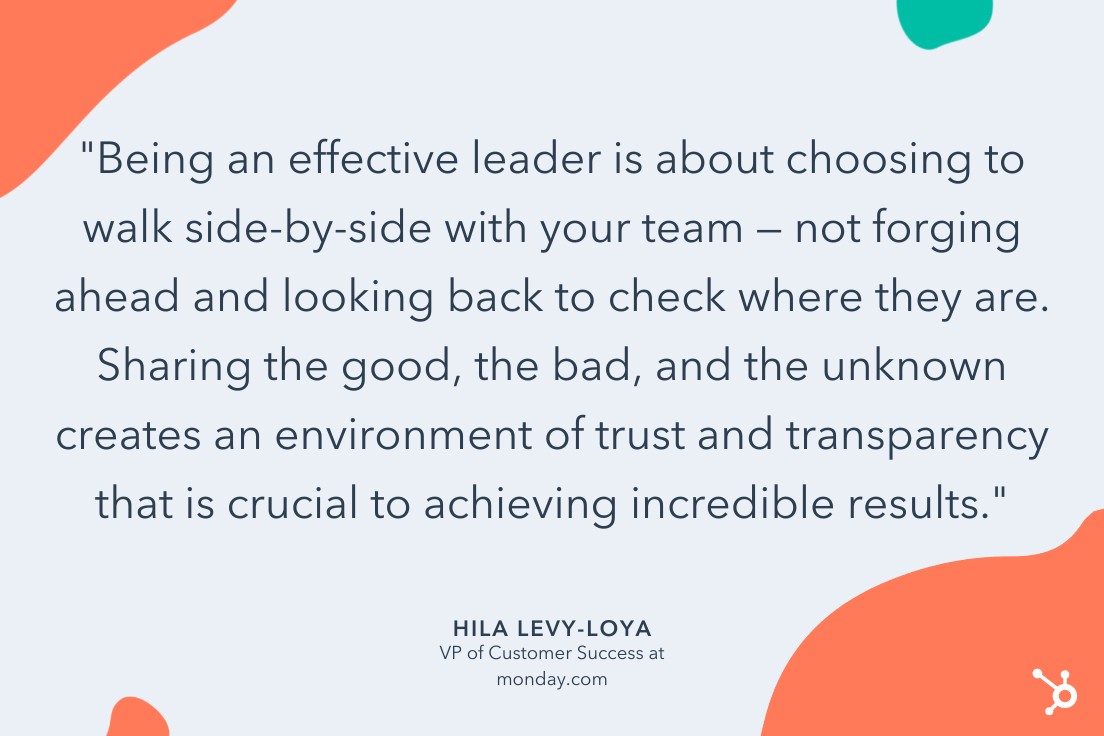
Along with discussing your team's responsibilities, you'll want to remain transparent about the bigger picture — including your long-term vision and goals.
Levy-Loya says, "The second step is granting your team access into your motivations so they can understand your 'zoomed out' view just as you do. Sharing the good, the bad, and the unknown creates an environment of trust and transparency that is crucial to achieving incredible results. With that ability to tap into each others perspectives, you and your team are able to pave the way together."
4. An effective leader always assumes good intent.
Lisa Toner, HubSpot's Director of Content Network, told me effective leaders always assume good intent, even when a team member makes a mistake.
As she puts it, "No one sets out to make a bad decision or mistake. When it happens, they're likely going to be more upset about it than you are, so no matter how frustrated you are, approach the issue with empathy, and calmly and supportively lead your team member towards a better outcome."
"Always assume good intent," Toner adds. "Reacting negatively will only knock their confidence in themselves — and you — in the long run."
Ultimately, good leadership doesn't happen overnight. To become an effective leader, you'll want to consistently request honest, candid feedback from your direct reports, and practice self-awareness to recognize — and improve — your leadership weaknesses.
Fortunately, your direct reports don't expect you to be perfect; they expect you to be human. Be humble, admit when you don't know, and collaborate with your team to leverage each person's expertise — all of which will bring you that much closer to truly leading effectively.

